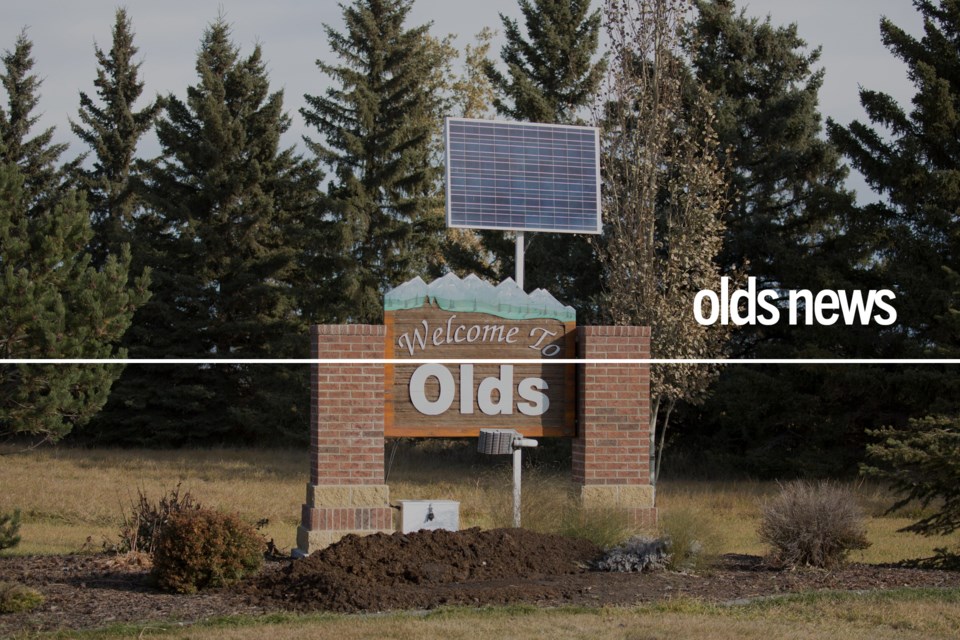OLDS — As town council wrestled with a funding gap in this year’s civic budget over the past few weeks, council has passed first reading of a tax rate bylaw that increases municipal rates by two per cent.
It is expected to come up for second and third reading during council’s April 25 meeting.
After debating the issue for much of the day on April 4, deputy mayor James Cummings suggested that finance director and interim chief administrative officer Sheena Linderman come back to council with what the impact of a two per cent tax increase would be.
Council was back in discussions on tax rates during the council meeting on Monday, April 11.
Most discussion prior to this week's meeting was between a 1.5 per cent or a two per cent hike. In both cases, that would mean taking money out of the town’s tax stabilization fund.
Essentially, Cummings as well as councillors Dan Daley and Wanda Blatz, along with mayor Judy Dahl argued in favour of a two per cent hike while councillors Heather Ryan, Harvey Walsh and Darren Wilson argued in favour of an increase in the 1.5 per cent range.
During a presentation to council, Linderman noted this budget replaces the town’s interim budget, approved on Dec. 13.
The proposed 2022 Town of Olds budget pegs revenues at $31,240,797 and expenses at $31,691,288, resulting in an operating deficit of $450,491.
The question then was what combination of tax hike, cuts to the budget and draw-down from the stabilization fund should be utilized.
In addition, Linderman said, a rise in the assessed value of property would result in an increase to the average residential home of $97 or 3.5 per cent. However, the average non-residential property would see a decrease of $99 or 0.9 per cent. That includes municipal, education and seniors’ requisitions.
“This is with no change to the tax rate,” Linderman wrote in an email.
Meanwhile, Linderman told council, inflation has risen more than five per cent lately.
As a result of all those factors, Cummings recommended raising taxes by two per cent this year, arguing that if that isn’t done, large tax hikes will be needed in the ensuring years, due to inflation, if nothing else.
Council members mulled over a few ideas on cuts that could be made to town operations in order to keep the tax hike as low as possible. They included not hiring – or at least postponing hiring – a second deputy fire chief.
Other ideas discussed included cutting back on computer replacement, RCMP building upgrades, tree replacement, and keeping a strategic planning session on-site rather than off-site.
It was also suggested that some events staged or coordinated by the Town of Olds could be dropped or cut back. Ryan suggested one option could be to finance them -- and perhaps some economic development spending -- out of the municipality’s Destination Olds fund.
Olds Fire Department Chief Justin Andrew predicted he might surprise council with this statement: he agreed with the idea of postponing the hiring of a second deputy fire chief for the time being, while the Town of Olds negotiates with Mountain View County regarding the covering of firefighting costs.
Cummings said it’s his understanding that a two per cent tax increase would cost taxpayers an extra $10, compared to a 1.5 per cent increase.
Wilson and Ryan argued that while that may not seem like a lot of money, there are people in the community who are living right on or near the poverty line and for them, $10 is a significant amount of money. So they argued for a 1.5 per cent increase (Wilson hinted he might like it to be even lower).
"I realize that you’re talking only $10, but $10 to some people is a lot of money, especially when they have to put gas in the tank,” Ryan said. “Where are they going to find the extra dollars?”
Cummings conceded that point, but again raised concern that if the municipality doesn’t hike taxes two per cent this year, an even higher hike will be needed next year and/or future years, thanks to inflation.
“It’s just a matter of understanding that we’re taking $209,000 out of a $290,000 budget with no guarantee that we’re going to be putting money back into that pot of money and next year we’re going to be having the same problem,” Cummings said.
“And next year, if that two per cent isn’t going to cover it; we’re going to need three, four or five per cent.”
Daley agreed with a comment by Blatz that the situation is one of "pay me now or pay me later."
He said the Town of Olds has an obligation to honour service level agreements.
Daley, dean of trades and skills at Olds College, said it’s a fact of life that, unfortunately, things are more expensive.
“You know in my experience, the cost of metal in the last two years has gone up 200 per cent,” he said.
“So moving forward, I would go for a two per cent increase and maintain a respectful level in the tax stabilization fund for upcoming years as well, because I’m sure we’re going to need it."
Both Wilson and Ryan said they too are leery of “draining” the town’s tax stabilization fund.
Rather than increasing taxes by two per cent, they said the time has likely come to make some very “hard decisions” on municipal spending.
“We can’t be all things to all people,” Ryan said.
Wilson cited the hiring of summer students as one area of spending that could be examined.



